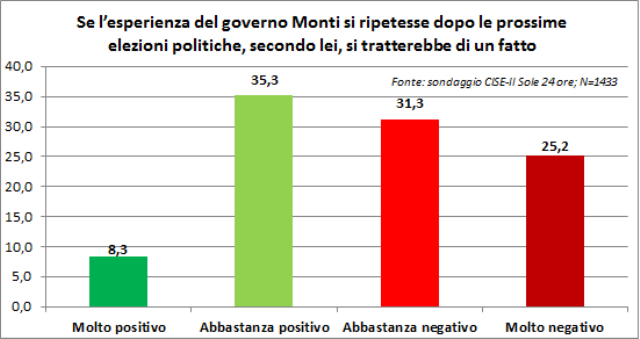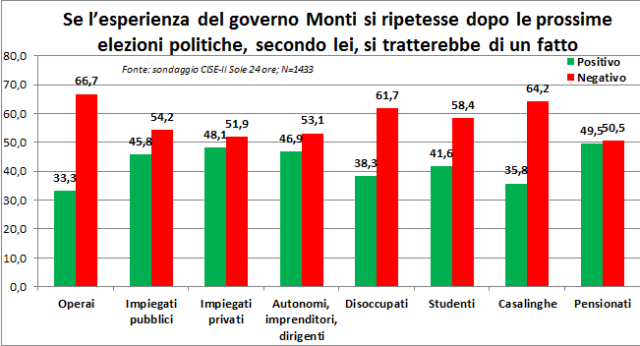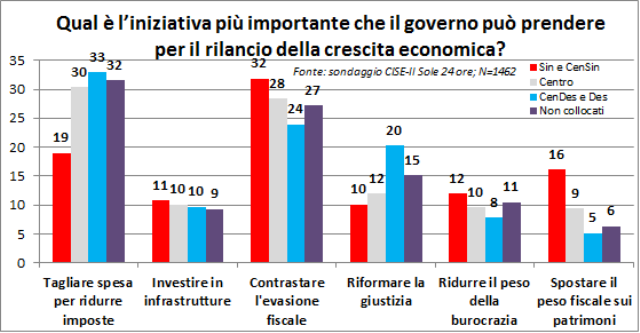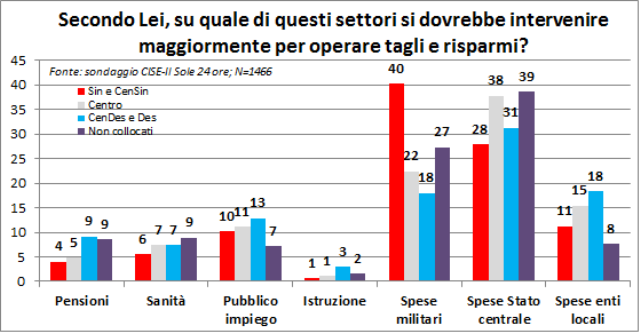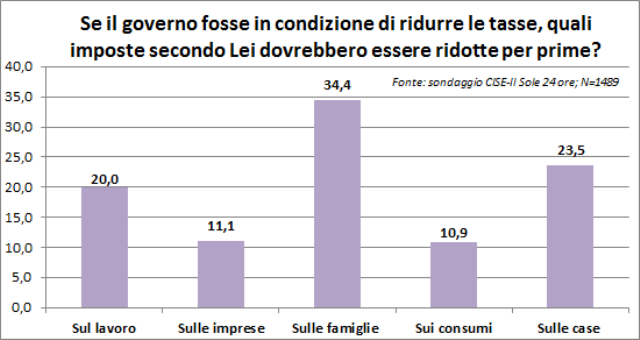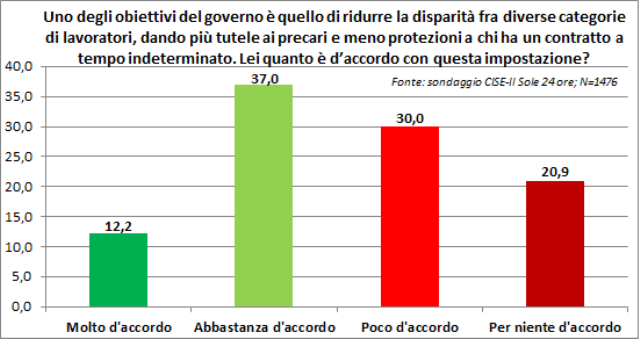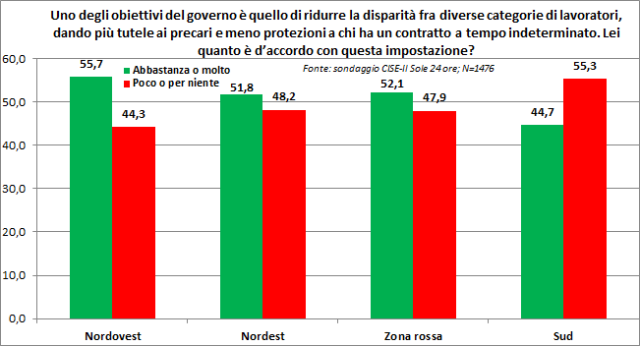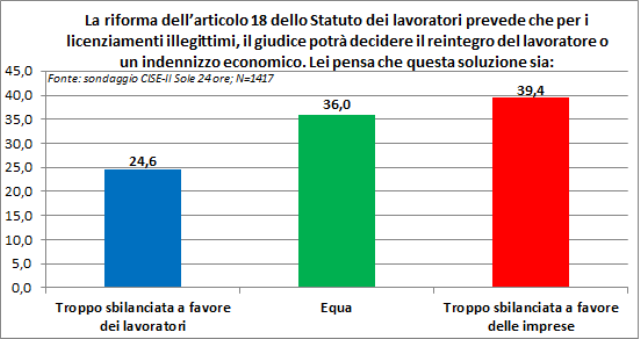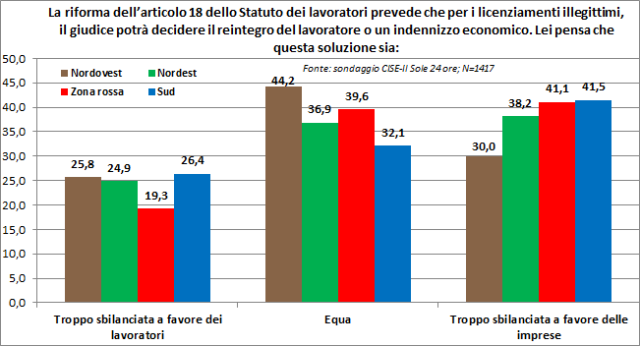Nel sondaggio Cise Economia 2012 (1500 interviste telefoniche condotte tra il 5 e il 12 aprile) abbiamo rilevato non soltanto il giudizio retrospettivo sull’attività svolta finora dal governo, ma anche alcune opinioni degli intervistati sulle prospettive e priorità future del governo.
Punto di partenza è una domanda che rileva l’opinione degli intervistati circa la possibilità che l’esperienza del governo Monti possa ripetersi dopo le prossime elezioni politiche. La maggioranza degli intervistati (pari al 56,5%) pensa che si tratterebbe di un fatto negativo, come si può vedere dalla figura. Inoltre, la percentuale di coloro che ritengono molto negativa tale eventualità è pari al 25,2%, mentre coloro che lo riterrebbero un fatto molto positivo sono solo l’8,3%.
In definitiva, la possibilità che in futuro ci possa essere un governo Monti bis non sembra trovare il gradimento della maggioranza dei nostri intervistati. Se si effettua l’incrocio con la domanda che rileva la collocazione socio-professionale dell’intervistato, si nota come questo dato sia riscontrabile più o meno in tutte le categorie, con l’eccezione dei pensionati dove i giudizi positivi e quelli negativi praticamente si equivalgono.
A questo punto, una volta analizzato il giudizio sul futuro del governo Monti oltre il 2013, passiamo a vedere quali dovrebbero essere, secondo i nostri intervistati, le prossime mosse del governo per affrontare la crisi economica. Alla domanda su quale possa essere l’iniziativa più importante del governo per rilanciare la crescita economica, il taglio della spesa pubblica e la lotta all’evasione fiscale sono le misure più gettonate dagli intervistati: circa il 28% del campione, infatti, indica tali misure come quelle più adatte a rilanciare la crescita. Al terzo posto si posiziona la riforma della giustizia, indicata dal 14,6%.
Se si effettua l’incrocio con la domanda che rileva l’auto-collocazione politica dell’intervistato, si nota però come i risultati siano diversi a seconda delle opinioni politiche. Tra coloro che si collocano sulla sinistra e sul centrosinistra, la lotta all’evasione rappresenta di gran lunga la priorità con il 31,9%, molto più del taglio della spesa che si attesta al 19%. Tra gli elettori di destra e di centrodestra il rapporto invece si inverte: coloro che indicano il taglio della spesa sono il 33%, mentre coloro che indicano la lotta all’evasione sono il 24%.
Per capire che cosa si intenda con “taglio della spesa”, bisogna guardare alle risposte ad un’altra domanda del sondaggio Cise, quella che riguarda la spending review. Per la precisione abbiamo chiesto quali sono i settori su cui si deve operare tagli e risparmi. Il 33,2% ha risposto che si deve risparmiare sulle spese per il funzionamento dello Stato e il 26,7% ha indicato le spese militari.
In altre parole il taglio della spesa vuole essere non un taglio dei servizi (pensioni e sanità), bensì un taglio alle inefficienze dello Stato. Anche in questo caso i risultati sono differenziati in base all’auto-collocazione politica. Tra gli intervistati di sinistra e di centrosinistra il 40,31% considera le spese militari come il settore dove tagliare e risparmiare di più, seguito dalle spese per il funzionamento dello Stato (27,8%). Tra gli intervistati di centro, invece, coloro che indicano le spese militari calano al 22,4%, scendendo poi al 18% tra gli intervistati di centrodestra e destra. Al contrario coloro che indicano le spese per il funzionamento dello Stato salgono al 31,3% tra gli intervistati di centrodestra e destra e al 37,8% tra gli intervistati di centro.
Nel sondaggio Cise è presente anche una domanda concernente la questione delle tasse. In particolare abbiamo chiesto quali sono le imposte che andrebbero ridotte per prime. Poco più di un terzo degli intervistati (34,4%) dice che andrebbero ridotte le imposte sulle famiglie (Irpef). Subito dopo vengono indicate le tasse sulla casa e i contributi Inps, con il 23,5% e il 20% rispettivamente.
Quando si considera l’incrocio con l’auto-collocazione politica, questo dato viene sostanzialmente confermato anche se la tassa sulla casa tra gli elettori di destra e centrodestra quasi eguaglia l’Irpef, mentre tra i non collocati addirittura la supera (il 35% indica l’Ici e il 28,6% l’Irpef).
Infine il sondaggio Cise ha affrontato anche la spinosa questione della riforma del mercato del lavoro che è stata al centro del dibattito pubblico per alcune settimane. Per ciò che concerne l’obiettivo principale dichiarato dal governo, ossia ridurre la disparità fra diverse categorie di lavoratori dando più tutele ai precari e meno protezioni a chi ha un contratto a tempo indeterminato, il campione è sostanzialmente spaccato a metà: il 49,1% si dichiara d’accordo con l’impostazione del governo, mentre il 50,9% si dichiara in disaccordo.
Questo dato è più o meno omogeneo tra le diverse categorie socio-professionali, con alcune eccezioni: tra le casalinghe e tra gli operai i giudizi negativi sono più marcati (tra gli operai il 54,2% si dichiara in disaccordo e tra le casalinghe i giudizi negativi sono pari al 58%), mentre tra i lavoratori autonomi prevalgono i giudizi positivi (56,5%).
Anche la zona geografica di residenza sembra essere correlata ad atteggiamenti differenziati: nel Nord-ovest il 55,5% si dichiara d’accordo con l’impostazione del governo, mentre al Sud il rapporto si inverte completamente, ossia il 55,3% si dichiara in disaccordo. Nel Nord-est e nella Zona Rossa invece il campione è più o meno spaccato a metà, ricalcando il dato nazionale.
Se si scende più nel dettaglio, chiedendo quale sia l’opinione circa la nuova formulazione dell’articolo 18 dello Statuto dei lavoratori, si vede come per il 39,4% del campione la soluzione adottata dal governo sia sbilanciata a favore delle imprese, mentre il 36% pensa che sia una soluzione equa. Infine il 24,6% pensa che sia sbilanciata a favore delle imprese: ci sono quindi 14,8 punti percentuali di differenza tra chi pensa che sia sbilanciata a favore delle imprese e chi pensa che sia sbilanciata a favore dei lavoratori.
In altre parole, se appare sbilanciata, la percezione è che lo sia a favore delle imprese. Tale percezione non sembra risentire troppo delle opinioni politiche dell’intervistato e lo stesso avviene se si considera la zona geografica di residenza, con l’eccezione del Nord-ovest: in questa zona del paese la maggioranza relativa degli intervistati (il 44,2%) pensa che la riforma sia equa, mentre ci sono solo cinque punti di differenza tra chi pensa che sia troppo sbilanciata a favore delle imprese (il 30%) e chi pensa che sia troppo sbilanciata a favore dei lavoratori (il 25,8%).
Se infine si effettua l’incrocio con la collocazione socio-professionale degli intervistati, si rilevano in alcune categorie delle differenze rispetto al dato generale. In particolare coloro che reputano equa la riforma sono la maggioranza assoluta tra i lavoratori autonomi (il 50,1%) e la maggioranza relativa tra gli studenti (il 45,9%). I pensionati invece sono la categoria dove le risposte sono più equamente distribuite, presentando quindi un orientamento meno chiaro: il 30,4% pensa che la riforma sia troppo sbilanciata a favore dei lavoratori, il 34,7% ritiene che sia equa e il 34,8% pensa che sia troppo sbilanciata a favore delle imprese.
